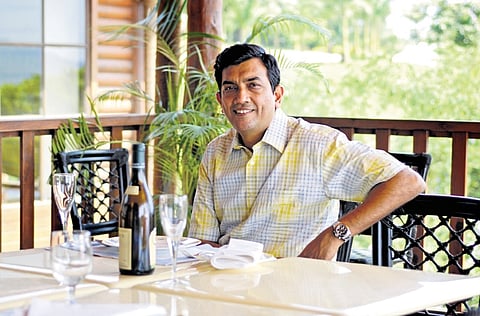

HYDERABAD: Wonderchef Sanjeev Kapoor was in the city recently, exploring the history and heritage of the City of Nizams. Grabbing the opportunity, CE had a chat with him, where he revealed his earliest memories of Hyderabad, his favourite dish from the city and shared some simple and sweet cooking tips!
Excerpts from the interview:
What comes to mind when you think of Hyderabad?
Some of the very first memories of my childhood are associated with Hyderabad. My father used to be with the State Bank of India and Hyderabad has a staff college. During his career, he came to this city many times and while returning home, he would bring for my mother, some pearls, Pochampalli sarees and even flower vases with Bidari work. (So, it was not food). But then, there were fruit biscuits from Karachi Bakery as well! When it comes to food, the city can easily be in top four to six ranks in India. A few years back we did a show called ‘Biryani Journeys’. We went to four cities in India to show the contrast between biryanis. We explored Lucknow biryani, Kolkata biryani, Malabar biryani and Hyderabad biryani. Interestingly, the episode most watched on YouTube was the Hyderabad one, which shows people’s intrigue with the dish.
Is Hyderabadi Biryani a brand in itself?
Absolutely! Especially, ‘Kachche Ghosht ki Biryani’, which I make regularly at home. It is different, unique, tasty and flavourful. I would rate it at number one in my list. The way it is cooked, there is always this amazement that boiled rice and raw meat, both are cooked together, and yet rice would not be overcooked and meat would be perfect. So there is science, art and taste of it.
What is your take on fusion of food and is it possible to take something of the past and merge it into something new?
That is always there. It has been happening for centuries and not just in India. With travels and migration, there is exchange of food, ingredients and culture. The pace of change is much slower than we think. It takes a lot of time for us to capture it. Around 400 years ago when tomatoes came, did someone think they would continue to be used for so long? This kind of change is not noticeable in one lifetime. When Persians came in, the way they had Irani chai there is so much different from how it is had here now. The soil, water and produce have their own uniqueness, depending on the place. The intent of the chefs today should be to preserve the past but not copy simply because it’s old. Take the best of it, make it relevant for today and do it in a way that it stays there for generations. Give them a chance to change that as well. We should not mock the change. The only way to make life better is to test and try. If you are not open to change, you may reject but be kind to it and respect it.
Do you still perceive food in the same way as when you started? How has your engagement with food changed over three decades?
What is part of life, cannot be monotony. Mother-daughter, father-son relationships can’t be monotonous. It will only grow more and more. My relationship with food is not transactional. It can never be boring for me. I am as excited as I always was. Just as I speak with my mother, wife and daughter everyday. The bond has only grown stronger. There is a lot of merit in the way we live our lives. If we understand food as something that gives life, it is not dead, there is value in such thinking. The fruit plucked from a plant still contributes to life. The conversion of an ingredient to a dish adds to life. Hence, there is always an aspect of novelty in this process.
Could you share one tip that you learned from people on ground and another one from your expertise for your fans?
I am always eager to learn something new. One of the first things that I learned as a chef was that potatoes take much longer if you cook them with any acidity: be it with tomatoes, curd or imli (tamarind). So add it later unless you are pressure cooking. That was not something that we were taught. A tip that I would like to share for people cooking at home: Plan your meals. We, as Indians, don’t plan ahead. We should plan our meals at least for a week. Put it down on your phones. Take 10-15 mins and do it with family. Spend that time with family, planning your meals. The benefit of it is that the headache of thinking what to cook today is gone, preparation time is reduced and you can delegate much more. The pain of thinking and taking irresponsible calls at the last minute is gone. The problem with such eating decisions is that you eat what you don’t want to eat and it is harmful from health point of view.